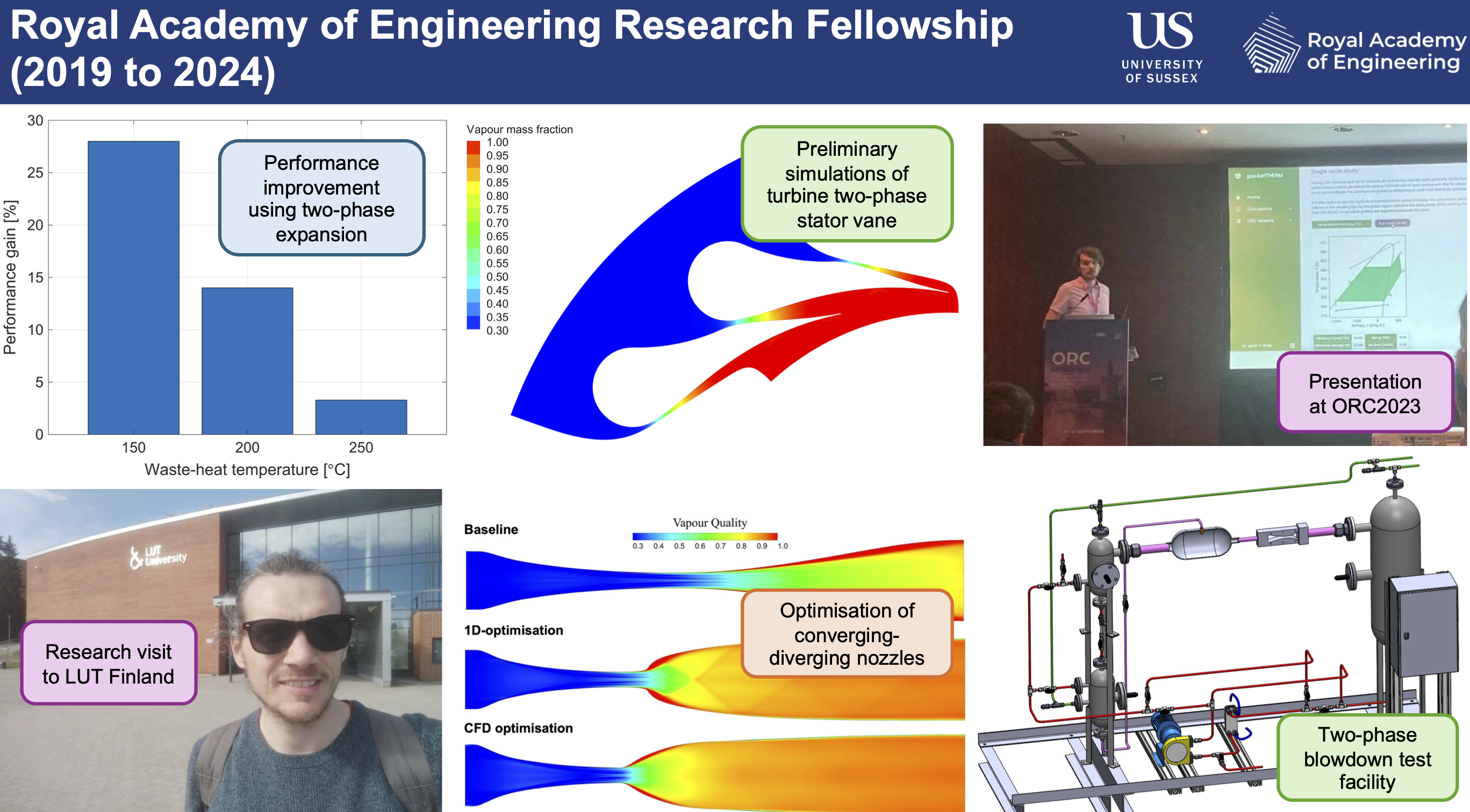End of my RAEng Research Fellowship journey
I first started this website back in 2019 when I was awarded a 5-year Royal Academy of Engineering Research Fellowship looking into two-phase expansion in ORC turbines. Now, as 2024 draws to a close, so does my time as a RAEng Research Fellow. In that time a lot has changed, including a global pandemic, the arrival of my son (how is he now 3?) and a change of institution. But what were the highlights, and what happened along the way?
Starting in 2019, the first year of my Fellowship started with a bang, and with all the excitement that comes when you start a new research endeavour. Some cycle optimisation studies focussed on optimising waste heat recovery plants using two-phase expansion quickly provided solid evidence that the concept had solid legs and helped to narrow the focus for subsequent studies. I also very naively jumped headfirst into the area of multi-phase computational-fluid dynamics thinking it was going to be easy… and then proceeded to spend many months with diverging solutions and getting just a tad frustrated!
The second year brought with it the first journal publication from the Fellowship, focussed on detailing the results from the system level optimisation carried out in Year 1. It also brought my first PhD student (Pawel) as primary supervisor, who was given the unenviable challenge of doing what I could not and start making progress in carrying out simulations of non-equilibrium multi-phase flows. Alongside this, I also started making some progress on developing design tools for two-phase nozzles that accounted for non-equilibrium effects.
As the third year rolled in, it brought with it attendance at the ORC2021 conference, where it was great to present some results that came from the start of a collaboration with a team from LUT in Finland. This initial study looked at how we could start to explore two-phase expansion in an existing turbine prototype using their ORC test loop. Year 3 also brought with it the second paper from Fellowship, which detailed the nozzle design tool developed and explored how non-equilibrium effects influence the expansion process. The third year also brought with it some very new experiences – one being the Conference Chair of NICFD 2022, but more importantly the second involved becoming a first-time parent and subsequently learning how to balance work and family life (although that learning never stops!)
Year 4 brought a move to the University of Sussex, and a move on from London after almost 10 years of commuting. After a settling period, day-to-day research into two-phase expansion continued. Pawel’s work was starting to generate some really nice results that we were able to publish in another journal paper – the first to detail non-equilibrium simulations of the two-phase expansion of siloxanes in converging-diverging nozzles. Alongside this, I also secured some funding for a summer intern to work with me over the summer to develop a free online educational tool for ORC and heat pump systems. This was presented at the ORC2023 conference (alongside some of Pawel’s research). That first year at Sussex was also one pumped-full of developing research proposals, and one full of a fair number of rejections (as is the nature of the game!).
The fifth and final year of my Fellowship turned attention to experimental development. My second primary PhD student (Charlie) joined me as Year 5 began, with again an unenviable task ahead of him. This time, to design and build a new and bespoke test facility to study two-phase expansion. Alongside this, I also won a Royal Society project to get some kit to develop a new ORC test loop, while the development of research proposals very much continued. As this final year has drawn to a close, me and Charlie attended NICFD2024 and gave an update about the test rig development, while Pawel published his second journal paper – this time on shape-optimisation of converging-diverging nozzles - and finished 2024 by submitting his PhD thesis.
As I now look back, through this Fellowship my team have delivered several key journal publications that have really pushed the boundaries of study in the field of two-phase expanding organic fluids. Starting from ground zero we have developed cycle models and demonstrated the potential of the technology, developed new turbine and nozzle design methodologies, carried out non-equilibrium simulations for the first time, and started the development of a unique test facility. Alongside this, I have been involved in other research projects funded by H2020 and EPSRC, which principally has included having the privilege to co-supervise another 3 PhD students who collectively helped to develop a new conceptual design for a 130 MW axial turbine operating with supercritical carbon dioxide.
So, what next?
Well, the next year or so will see Charlie’s rig develop, and I can’t wait to see the first set of experimental results on two-phase expansion of organic fluids coming out from that. We will also continue to push the boundaries within two-phase non-equilibrium simulations.
But more importantly, while this Fellowship has made significant strides in the research area, it has also opened up many more questions that still need exploration. Over the years of the Fellowship, the importance of two-phase flows in other applications has also emerged, including heat pumps, refrigeration systems and supercritical carbon dioxide systems as examples. So, there is still much to do, and of course research proposals to write – hopefully I am only just getting started.

Want to know more?
Below is a list of related blog posts:
- First milestone of my RAEng Research Fellowship and my latest publication
- Second paper from my RAEng Fellowship
- Wet-to-dry expansion: Part 3
- Introducting pocketTHERM (online educational tool)
Find out more about my team and publications
Acknowledgement
The financial support of the Royal Academy of Engineering, United Kingdom is also gratefully acknowledged (Award number: RF\201819\18\23).